Share
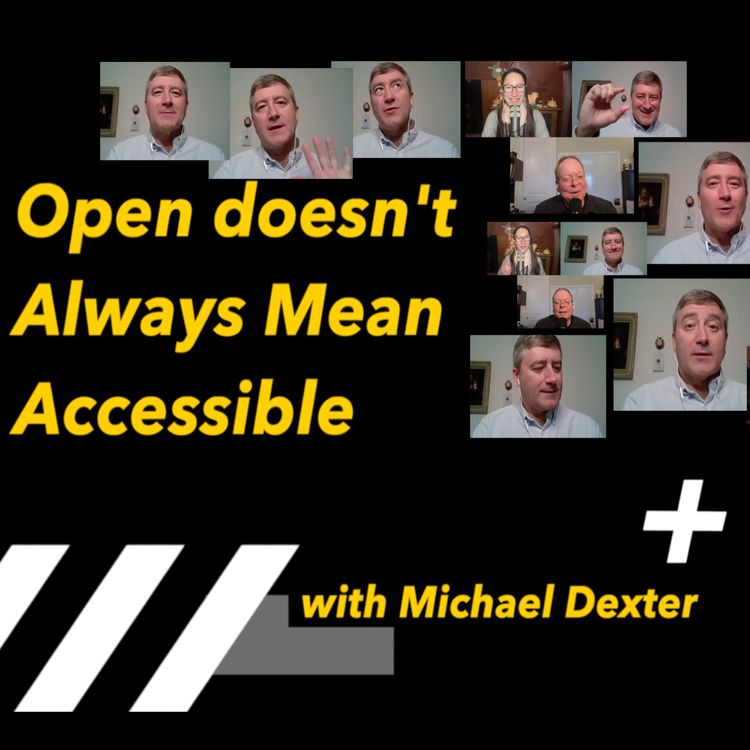
My Open Source Experience Podcast
Open doesn't Always Mean Accessible
By definition, open source projects and communities are supposed to be accessible. And while the code is always openly available, the remaining parts of the ecosystem might be further out of reach than you would think
In this episode of the My Open Source Experience Podcast, Michael Dexter, Ildiko and Phil explore the open source ecosystem from two perspectives: business and accessibility. Businesses rely on open source software, soemtimes unknowinlgy, all around the globe as digital infrastructure doesn't exist without it any more, and yet, making it integral part of the business strategy is a constant struggle for companies. And yet, even when companies and individuals reach the point of investing their time, money and resources into open source projects it appears to be more difficult than it is supposed to be. Michael, Ildiko and Phil are discussing these challenges and digging into how to address them.
Learn more about:
- The relationship between open source and business interests
- The fragility of funding in the open source ecosystem
- The role of open source foundations
- Stages of involvement in open source projects
- Maintainer shortage and how to bring people (back) into open source projects
More episodes
View all episodes
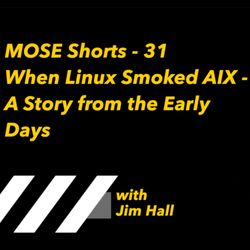
MOSE Shorts - 31: When Linux Smoked AIX - A Story from the Early Days
08:37|In this MOSE Short segment Jim Hall talks about his experience of introducing open source at every company where he worked. He also shares a story about starting to deploy Linux servers at one occasion, which outperformed the AIX systems that the company had at the time. They ended choosing Linux because it was the best technology for their use case on the market, with enterprise support and a very favoarble price tag. It just happened to be open source.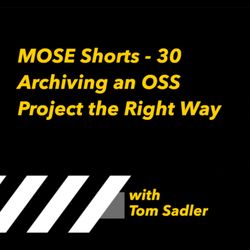
MOSE Shorts 30: Archiving a Project the Right Way
07:13|Technology, just as everything else moves forward, and sometimes that means that a project gets superseeded by something else that is better, more performant and a more promising options long term. When your project reaches this phase, it still matters what process you choose to follow when you archive it, since abandoning it silently from one day to the other is harmful to everyone else who is still relying on it and is under the impression that the project is still maintained by the community.In this segment of the My Open Source Experience podcast Tom Sadler talks about te TAL (TV Application Layer) project, which they have been using on TV devices. While the project is still used within the BBC in some corner cases, it is largely replaced by web technologies by now. When it comes to the open source project, maintainers of the project chose to mark it clearly archived on GitHub and even left an email address for people to reach out in case they have a question or comment about the project. Surprisingly, this provided an opportunity to the ecosystem to still connect about the overall technology and problem space, which turend into a tech meetup series.Learn about the stpes of archiving a project, such as:- Marking it 'Archived' on its hosting platform- Updating the README- Closing issues and bug reports- Closing Pull Requests or Reviews- Leave contact information, if there's still someone who can follow up on questions and commentsAlso keep in mind the CRA, as there are some requirements coming about how to properly archive a project!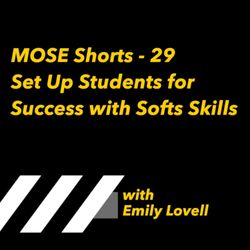
MOSE Shorts - 29: Set Up Students for Success with Softs Skills
08:52|In this MOSE Short segment Emily, Ildiko and Phil talk about the improtance of being able to make an argument to succeed in both open source and corporate environments. The group also discusses how mentorship programs that help students participate in open source projects can be encouraging for them to stay and thrive in the tech industry.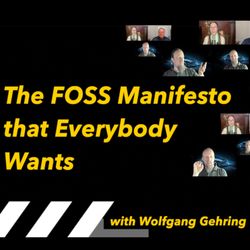
8. The FOSS Manifesto that Everybody Wants
42:12||Season 3, Ep. 8Deciding to go all in on open source is often an enormous milestone in itself, however, it is just a small first step in the overall change process. Many companies have the buy-in on the engineering level, and some have it in the top management as well, but that is not enough!In this episode of the My Open Source Experience podcast, Wolfgang Gehring shares his journey through this transformation within his company, Mercedes-Benz, which has been centered around a FOSS Manifesto that made a huge impact in the industry.Learn more about:- The Mercedes-Benz FOSS Manifesto- The influence the company achieved, internally and industry-wide, by publishing their manifesto: https://opensource.mercedes-benz.com/manifesto/ - Why the company made the manifesto available under the Creative Commons license- Automotive-focused open source groups- Knowledge building and sharing within a large company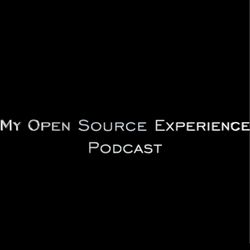
7. Let's Talk Business, Standards and Open Source
43:43||Season 3, Ep. 7Both business language and standards can be very strict, especially when we are looking into practices of governments or highly regulated industries like automotive and telecommunications. On the contrary, open source is developed by diverse groups, where standards and regulations don't apply to all use cases, and is often valued for its flexibility. So, how do all these fit together?In this episode of the My Open Source Experience podcast, industry experts explore how to fit open source into very strict processes and standards.- Ashan Senevirathne covers efforts in the telecom segment where standards, technology evolution and open source clash- Austen Bryan share his experience with fitting open source into the acquisition guidelines and processes that the United States government has- Magnus Buhrgard highlights examples of bringing open source standards and patents closer to each other- Philipp Ahmann talks about safety standards in the automotive industry, and highlights where open source is used within cars- Samson Goddy shares tips on how to talk about open source in corporate environments using business language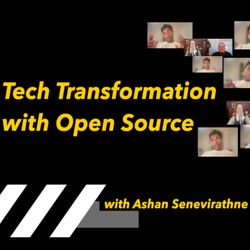
6. Tech Transformation with Open Source
44:14||Season 3, Ep. 6Technology provides a lot of opportunities and companies need to be flexible to grab them, but they aren't always ready. The telecommunications segment is an example where flexibility is not a given, historically.In this episode of the My Open Source Experience podcast, Ashan Senevirathne talks about his experience working for operators in the telecom segment. As operators are transforming their networks it's not enough to just into the software, they also need to evolve company practices and culture. Open source plays a key role in this overall transformation.Learn more about:- The five nines concept, and how that pairs with failing fast- Transforming a telco in to a tech-co- How ot get from strong proprietary culture to open sourcing a project- The role of FOSS guidelines- Open source business values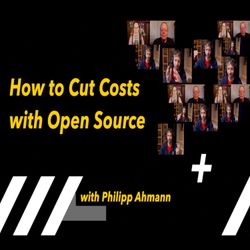
5. How to Cut Costs with Open Source
42:14||Season 3, Ep. 5Open source is still often looked at as free software, as in no cost. Those who think this is the value of OSS, they usually use and integrate it in a more expensive way than they should.In this episode of the My Open Source Experience podcast Philipp Ahmann talks about his experience with open source in the automotive industry, which is very sensitive to development, innovation and maintenance costs. He also shares a story about attempting to fix a plane's entertainment system in flight. Did he succeed?Learn more about:- Cost savings through relying on open source- The importance of reusability, and how open source supports that- Vendor lock-in with open source- The price of maintaining a fork downstream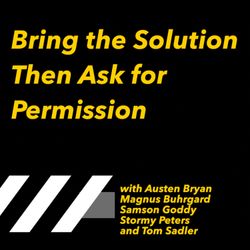
4. Bring the Solution Then Ask for Permission
43:18||Season 3, Ep. 4Open source in the corporate world is often counterintuitive, since the norms, practices and processes are very different, or at least they seem like. But it doesn't have to be that scary and complicated as it looks.In this episode of the My Open Source Experience podcast, guests talk about their experience with making open source work within a company, to the extent of working upstream. Topics cover management layers, corporate structure, change management and how individuals experience participating in open source communities.Hear more from:- Stormy Peters on (the lack of) social norms, open source champions and the maintenance lock-in of proprietary code within companies- Magnus Buhrgard on the fears middle layer management has about open source and landing OSS code in a product- Samson Goddy on the importance of speaking the business language and the challenge with corporate company structures when it comes to open source- Tom Sadler on what motivates or keeps individuals back from contributing to open source- Austen Bryan on how to succeed with implementing changes in an organization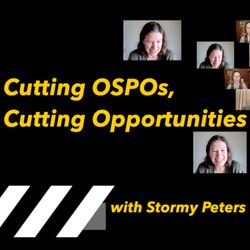
3. Cutting OSPOs, Cutting Opportunities | My Open Source Experience Podcast
42:31||Season 3, Ep. 3In life, in industry and sometimes in open source, we keep re-inventing and re-implementing things. If all software development happened behind closed doors we didn't have any other choice but to do duplicative work and slow down innovation.In this episode of the My Open Source Experience podcast Stormy Peters shares how the desire to avoid wasteful practices in software development drove her to open source. Her career has been revolving around OSS and she put her passion and growing experience into good use by helping companies, big and small, to build structure, processes and practices to be able to invest and engage in open source.Learn more about:- How to enable a company to rely and engage with open source- Challenges with open source licenses and copyright- Building an OSPO- Company acquisition and how to approach that from an OSPO- Tools that help investing in and working with open source- The concepts of an old and a young OSPO- The evolution of an OSPO